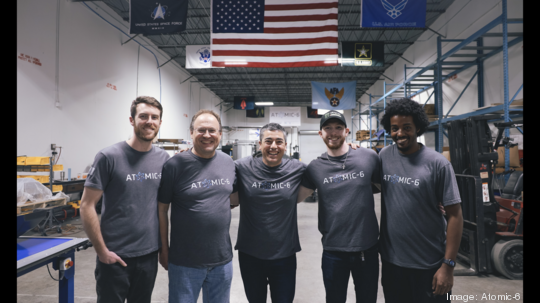
Space is the highest priority, says founder of Atomic-6 Trevor Smith, whose startup has developed a Mars Rover prototype and materials for hypersonic aircraft.
Smith had previously been in talks with the former CEO of the space flight company Blue Origin, Rob Meyerson. At the time, the volume of parts for Blue Origin was so low that it wasn’t a viable business plan.
Now, Smith believes his company has the capability to tackle structural issues for some of the most exciting names in aerospace including Elon Musk’s SpaceX, Lockheed Martin and Boeing in addition to Jeff Bezos’ Blue Origin.
“They are sending more satellites in the next two years than ever in human history, so there’s clearly a growing demand,” said Smith. “If we have the best manufacturing in the world, that gives the potential to sell in multi-billion dollars.”
Atomic-6 manufactures components that are lightweight and efficient for the aerospace, space, hypersonic and ballistic industries. Compared to other providers, they use raw materials that are up to 70% cheaper and components with speeds up to 120 times faster.
The company is now taking itself out of stealth mode with hopes of big future investments, expansive hiring and partnering with some of the most recognizable companies.
In the company's first three years, Smith self-funded the company while him and his co-founder worked in the lab. It now has six full-time employees and plans to have 15 to 20 by the end of the year. A quarter of those hires will have PhDs in composite material sciences. The rest will be composite technicians.
In May of last year, the company signed a lease for their warehouse. After expanding next door, that space has tripled in size to accommodate for their growing workforce and collection of equipment.
To date, Atomic-6 has received $4.9 million in investments and grants. Its investors include IronGate Capital Advisors and Starburst Aerospace.
Recently, the company has received grants of almost a million dollars each from the U.S. Air Force and Space Force to create support structures for systems similar to ones used on the International Space Station and to protect an unmanned combat aircraft from bursting due to high internal pressure.
By the end of the year, the company hopes to raise a Series A round between $6 to $8 million from strategic defense venture investors.
According to Smith, the addressable market for the four industries the company works in is worth $4.1 trillion.
Once Atomic-6 is ready to expand beyond 20 employees and go through a Series B funding round, the company will need to move out of its current warehouse. While the company prioritizes Atlanta for any future move, it could move its headquarters elsewhere.
Since its inception in the metro-Atlanta area, Atomic-6's operations had been in stealth mode to make sure their technology had solid results.
During that time, the company has developed a mars rover prototype that is lighter than aluminum and stronger than steel, a battery enclosure for hybrid electric aircraft, ballistic plate protection that beat the military's weight and thickness standards to stop 9-millimeter bullets, and is currently developing a panel that can withstand speeds of 3,800 miles per hour.
Smith says that being in Atlanta has certainly been to his advantage for growing his business, saying that “we’ve planted a home here, I’d like to keep it here."
He lists the cost of living, having companies like Lockheed Martin close by, available tax credits and a healthy relationship with the state government making it a good environment to grow his company.
However, other locations have other benefits including a talent pool more experienced in the composite sciences.
Tennessee, for example, has a large composites industrial base, a carbon manufacturing facility and strong ties to the University of Tennessee.
Smith says that another advantage of moving to Tennessee is one that Georgia could easily improve on: local talent in the composite sciences.
“Ultimately as a business, the biggest concern is the talent pool … having educated employees up to speed, that's where value is,” said Smith. “If Georgia or the Georgia Aerospace Economic Team put together trade programs to help educate for advanced manufacturing, it would be very attractive.”



